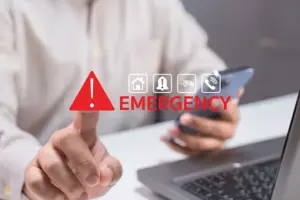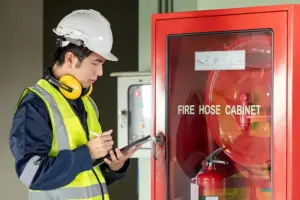In the world of property management, whether commercial or residential, the strength of management and tenant relationships can significantly impact the effectiveness of emergency management. For property managers, building trust and fostering cooperation with tenants is crucial and pays dividends during emergencies. This blog explores the importance of these relationships and how they can enhance building emergency preparedness and response quality.
Building Tenant Trust and Cooperation
Trust and Safety: Trust is not just a byproduct of good management; it’s a critical component of emergency preparedness. When tenants trust their property managers, they are more likely to follow directives without hesitation during emergencies. This trust is built over time through consistent and transparent communication, reliability in handling tenant concerns, and visible commitment to safety. A trusted manager can effectively coordinate safety drills and ensure tenants understand and respect emergency protocols, which can significantly reduce chaos and confusion during actual emergencies.
Communication: Clear and consistent communication is the bedrock of trust. Property managers must establish communication channels that are easily accessible and reliable. Regular updates about safety measures, changes in emergency procedures, and even minor maintenance issues can reinforce tenants’ perception of management’s competence and dedication. Moreover, during emergencies, the ability to communicate swiftly and effectively can prevent misinformation, reduce panic, and ensure that tenants receive accurate instructions.
Addressing a Universal Challenge
Common Pain Points: Emergency management is a common challenge across all types of properties, but tenant cooperation often varies. Managers frequently struggle with tenants who underestimate the importance of safety protocols. By building strong relationships, managers can transform this challenge into an opportunity. Engaged tenants are more likely to participate in safety drills and adhere to emergency procedures, which enhances the overall safety of the building. Strong relationships can also foster a culture of safety, where tenants feel responsible for not only their safety but also that of their neighbors.
Proactive Leadership: In the realm of property management, proactive leadership involves more than just managing physical spaces; it encompasses fostering a community-centric environment. By leveraging soft skills such as empathy, active listening, and effective communication, property managers can inspire tenants to take an active role in safety measures. This proactive approach not only enhances the building’s emergency preparedness but also positions property managers as leaders who are committed to the well-being of their tenants.
Encouraging Two-Way Communication
Feedback and Involvement: Viewing tenants as active participants rather than passive occupants is crucial for effective emergency management. Encouraging tenant feedback on safety procedures and drills can provide valuable insights into potential improvements. This involvement not only empowers tenants but also fosters a sense of ownership and responsibility towards the community’s safety. Managers can implement suggestion boxes, surveys, or regular meetings to gather feedback, ensuring that tenants feel heard and valued.
Promoting Emotional Connection
Humanizing Management: Emergency management often involves technical details and regulatory compliance, which can seem impersonal. By focusing on relationships, property managers can humanize these aspects, making them more relatable. Sharing stories of past emergencies, discussing personal experiences, or highlighting tenant testimonials can create an emotional connection. This approach not only engages tenants but also underscores the importance of preparedness from a human perspective, making safety measures more meaningful.
Inspiring Thought Leadership and Conversation
Community Engagement: Encouraging property managers to share their experiences and strategies can foster a culture of thought leadership. By creating platforms for discussion, such as workshops, webinars, or online forums, managers can learn from each other and collectively improve their emergency preparedness strategies. This collaborative approach not only enhances individual capabilities but also strengthens the property management community as a whole, leading to safer and more resilient buildings.
Reinforcing the Importance of Community in Crisis
Cooperative Environment: In times of crisis, a cohesive and cooperative building environment can significantly mitigate chaos. By emphasizing the importance of community, property managers can encourage tenants to look out for each other, share resources, and support one another during emergencies. This sense of community not only enhances safety but also fosters a positive living environment, where tenants feel connected and cared for. Managers can organize community-building activities, such as safety workshops or social events, to strengthen these bonds.
Conclusion
In conclusion, building strong relationships with tenants is a strategic advantage in managing building emergencies. By fostering trust, encouraging communication, and promoting a sense of community, property managers can enhance their emergency preparedness and response. These relationships not only improve safety outcomes but also create a more harmonious living environment.
Evaluate your current tenant relationships and implement strategies to strengthen them. Reach out to WPS for resources and support in enhancing your emergency management plans.




